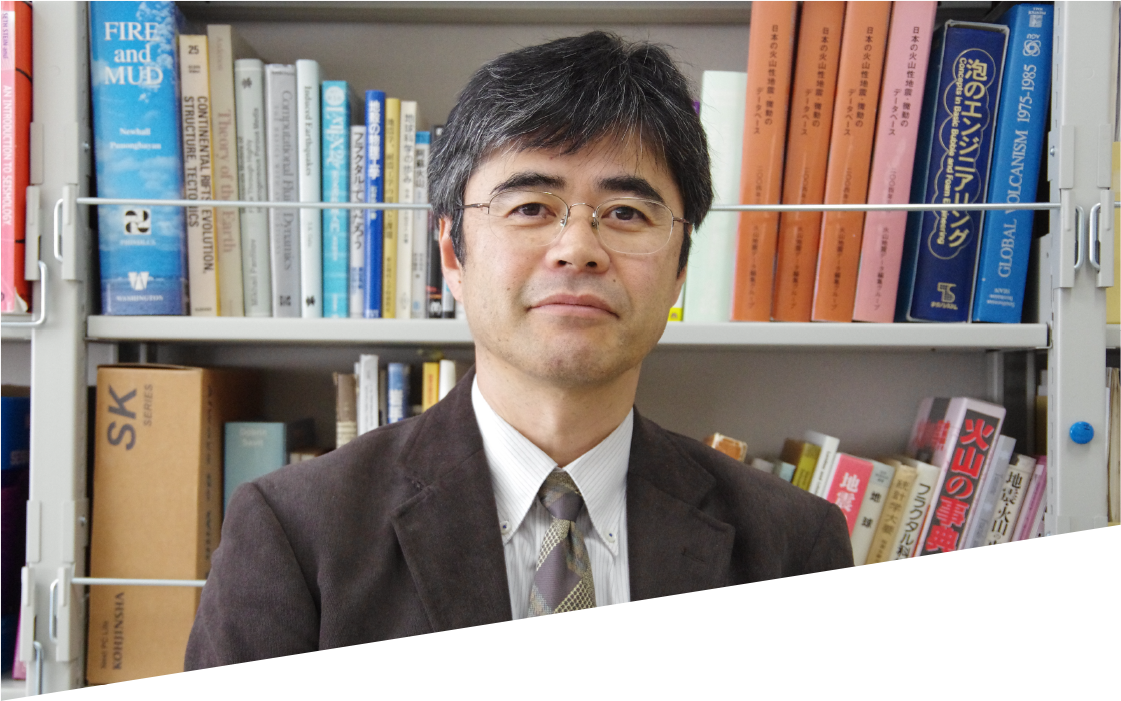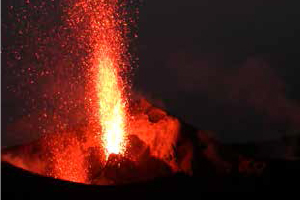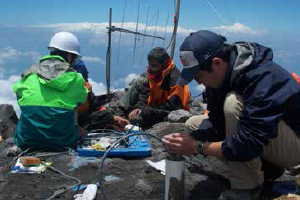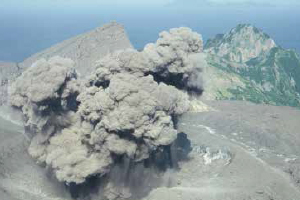


--Why is this project being launched now?
 In the 2000s, there was a long period with few volcanic eruptions, but in 2014, more than 60 people were victim to the sudden eruption of Mount Ontake in Nagano Prefecture, and the need to continue advancing volcano research was better recognized. As a successful eruption prediction, the Mount Usu (Hokkaido Prefecture) eruption in 2000 is well-known; however, only a small proportion of volcanoes show clear indications of eruption as Mount Usu and it remains challenging to predict eruptions from many volcanoes. To meet this challenge, we must develop talented people who can improve the precision of eruption predictions in the future by advancing this project. This is also an opportunity to better communicate with the general public, so they can know the current state of volcanic eruption forecasts and think about ways to reduce damage from volcanic eruptions.
In the 2000s, there was a long period with few volcanic eruptions, but in 2014, more than 60 people were victim to the sudden eruption of Mount Ontake in Nagano Prefecture, and the need to continue advancing volcano research was better recognized. As a successful eruption prediction, the Mount Usu (Hokkaido Prefecture) eruption in 2000 is well-known; however, only a small proportion of volcanoes show clear indications of eruption as Mount Usu and it remains challenging to predict eruptions from many volcanoes. To meet this challenge, we must develop talented people who can improve the precision of eruption predictions in the future by advancing this project. This is also an opportunity to better communicate with the general public, so they can know the current state of volcanic eruption forecasts and think about ways to reduce damage from volcanic eruptions.
From the start of the eruption prediction project in 1974, volcano monitoring technology has advanced steadily, and has also contributed to the development of volcanology as a discipline. With the three main fields of geophysics, geology/petrology, and geochemistry each advancing independently to understand volcanic phenomena, the status of volcanic activity has become much clearer. In addition, theoretical modeling of volcanic eruption mechanisms has advanced by implementing survey observations and theoretical research. There are signs that this modeling can be utilized to reduce volcano damage. Currently, integrated research, connecting these different academic fields, has developed organically. By training researchers to open-up the next generation of volcanology, I hope to develop talented people who can deepen our understanding of diverse volcanic phenomena and contribute to volcano disaster mitigation.
--Please send a message to students studying volcanology.
 During the period when students acquire basic academic knowledge and skills to start research, I want them to understand the importance of advancing research with connections to society in mind, and collaborating with related disciplines in addition to focusing on their specialization. Not everything can be accomplished in two years, but I expect that young students get familiar with the appeal of various fields of study while young students will develop minds that do not hesitate to absorb knowledge from related disciplines. I hope that students take advantage of this program, find ways to study and conduct research that suit them, and create new volcanology.
During the period when students acquire basic academic knowledge and skills to start research, I want them to understand the importance of advancing research with connections to society in mind, and collaborating with related disciplines in addition to focusing on their specialization. Not everything can be accomplished in two years, but I expect that young students get familiar with the appeal of various fields of study while young students will develop minds that do not hesitate to absorb knowledge from related disciplines. I hope that students take advantage of this program, find ways to study and conduct research that suit them, and create new volcanology.
--Please send a message to national agencies, local municipalities, and private companies involved in volcano disaster mitigation.
 How do you utilize research results to disaster reduction? This is the big question driving the Next Generation Volcano Research Project and Consortium for Human Resource Development in Volcanology. I would like local municipalities and national agencies that work at disaster sites to participate in this consortium, and provide young students with opportunities for exposure to the information needed and organization at disaster sites. I would also appreciate collaborations with private companies that have developed cutting-edge measurement technology and information transmission methods or knowledge of volcano disaster mitigation, which would provide an environment where we can strive to raise the standards of volcano research.
How do you utilize research results to disaster reduction? This is the big question driving the Next Generation Volcano Research Project and Consortium for Human Resource Development in Volcanology. I would like local municipalities and national agencies that work at disaster sites to participate in this consortium, and provide young students with opportunities for exposure to the information needed and organization at disaster sites. I would also appreciate collaborations with private companies that have developed cutting-edge measurement technology and information transmission methods or knowledge of volcano disaster mitigation, which would provide an environment where we can strive to raise the standards of volcano research.